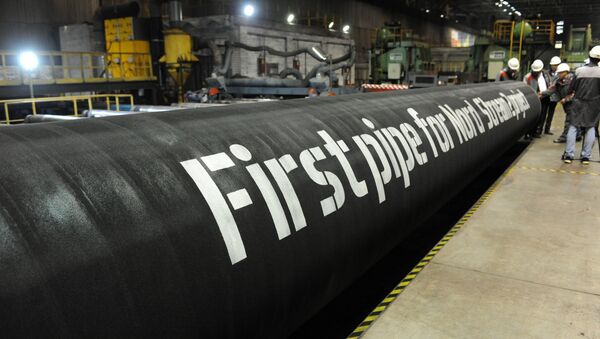Sputnik discussed the issue with Vladimír Štěpán, an energy expert from ENAS.
Sputnik: Why does this statement come at this particular time? The statement is astonishing, as Prime Minister Sobotka's government saw a threat in the Nord Stream-2 project; they considered it even greater dependence on Russia.
Štěpán: There has been a big shift at the Ministry of Industry, so now this pipeline is a benefit for the Czech Republic. This is due to the fact that there is a transit system with a capacity of over 55 billion cubic meters in the Czech Republic and, as the individual contracts for gas transit from the east to the Czech Republic end, this system would be largely untapped. Therefore, if the gas flowed from the west via Germany across the Czech Republic, it would be a benefit similar to what we experienced in the 1970s. I still remember that. Gas transit started in 1973, and not only was it an economic benefit but it also promoted gas consumption and was ecologically useful. There is a big problem in the Czech Republic with completing nuclear power units as it's very expensive; RESOPs have also proved to be ineffective. Natural gas is the only thing that can be quickly used to tackle the issue of air pollution levels, which are among the worst in Europe. We know for sure that Russian gas is very clean, so we leave the policy aside and use what would most certainly help us achieve the goal.
READ MORE: US to Introduce Sanctions Against Nord Stream 2 Project — German Official
Sputnik: Why has Mr. Řepka's statement come at this particular time?
Štěpán: I don't really know, but this may be the reaction to the fact that the construction of Nord Stream-2 has already started. There have been some protests by Poland and some other states. As for this controversial construction, the Czech Republic under Prime Minister Sobotka was against this gas pipeline; now we see a more sensible view emerging. I think the discussion on this gas pipeline will continue. We know the US President's position on that, and I think that's the reason why the country had shown no support for the project. The Czech Republic kept silent, as it couldn't determine its position on the pipeline. It was necessary for the Ministry of Industry to express its opinion in some way, and I think it's a good thing that they've done it.
Sputnik: It's believed that if Nord Stream-2 weren't launched, it would bring an increase in gas prices for Czech consumers. Do you agree with that?
Štěpán: Well, sure! If you are using a transit pipeline, that meant that someone has paid for it. If the domestic demand remains the same as it is now, then it's logical to increase gas prices for domestic customers. The dismantling of this transit infrastructure will cost billions of korunas.
READ MORE: Nord Stream 2 Operator Laid Over 18 Miles of Pipes in German Waters — Spokesman
Sputnik: Do you think Nord Stream-2 will be completed?
Štěpán: I don't think there is any doubt about that. I don't know anyone to stop it.
Sputnik: The European Commission…
Štěpán: I think what the European Commission says is not so dramatic. We know that the Dutch also need Russian gas. Gas is transported to Bavaria through the Czech Republic, which is cut off from the rest of Germany. Their nuclear power plants and coal mines have closed down; they must be replaced with something. The vital Nord Stream pipeline goes across the Czech Republic to supply part of Western Europe, including Germany. And then across the Czech Republic the gas flows further to the east and to the south of Europe. This is a perfect solution to make use of the existing transit system, as it will be the cheapest option. In the Czech Republic, reverse flows are now taking place. It is not economically expensive to turn the gas from west to east and then use the existing Slovak transit system. Via Slovakia, gas can also go to Baumgarten and farther on. Basically, it's an increase in security. I would have been in favor of partly preserving the transit from the east through Ukraine and Slovakia due to transport routes diversification and security. That would be great, if there was a reasonable agreement between Russia and Ukraine.
The views and opinions expressed by the contributors do not necessarily reflect those of Sputnik.



